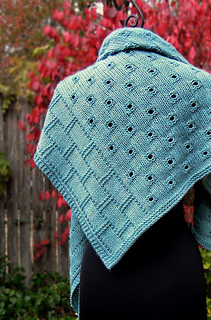patterns >  Dee O'Keefe Designs
Dee O'Keefe Designs
> Caine










Caine
Caine is a contemporary, textured lace shawl. The asymmetrical shaping begins with just a few stitches which then flow into a basket weave panel. While that panel forms the left edge of the shawl, the remainder of the body is a growing field of eyelets surrounded by reverse stockinette boxes. The versatile shape may be draped in many configurations to be worn as either a shawl or a scarf.
Caine is a great first lace project since there is minimal shaping and both the basket weave pattern and the simple eyelet pattern are very intuitive to knit and easy to memorize. And working with a heavier weight yarn than is usually used for lace not only adds a fabulous texture to the shawl but makes it easier (and faster!) for newer lace knitters to knit up. If you can knit and purl with ease and are familiar with basic k2tog/ssk decreases and make 1/yarn over increases, you should be able to make this shawl with ease once you get in the rhythm of the stitch patterns.
While dimensions and yardage are provided for worsted weight, Caine could effectively be worked in other yarn weights, although sport weight or heavier is recommended to show off the texture to its best advantage.
The Caine pattern includes both charts and full written out instructions for those of you who prefer not to use charts.
Size and Yardage: My sample shawl pictured used about 525 yards (480 m) and measures 66 x 28” (168 x 71 cm), relaxed after blocking. Test knitted shawls used between 525-565 yards (480-517 m), all worked on a US Size 8 / 5.0 mm needle. The size is easy to customize by changing the number of Chart 4 repeats; full instructions are provided, including how to calculate stitch counts for any size. Also included are detailed blocking instructions.
Construction: Caine starts at the left tip of the basket weave panel with only 3 stitches cast on. There is a 3-stitch garter border along both the wingspan and panel edges. The wingspan edge has make-one-right increases on each right-side row and is the longest side of the triangle. The panel edge is the second-longest side of the triangle; the bind-off edge is the shortest side.
88506 projects
stashed
46983 times
- First published: December 2016
- Page created: December 1, 2016
- Last updated: January 31, 2025 …
- visits in the last 24 hours
- visitors right now





